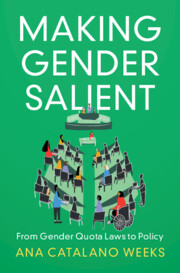Book contents
- Frontmatter
- Dedication
- Contents
- List of Figures
- List of Tables
- Acknowledgments
- 1 Introduction
- 2 When Do Quotas Matter? A Theory of the Substantive Representation of Cross-Cutting Interests
- 3 What Do Women Want? Gender Gaps in Preferences
- 4 The First Stage of Policy Change: The Effects of Quotas on Party Priorities
- 5 The Effects of Gender Quota Laws on Work–Family Policies
- 6 How Gender Quota Laws Change Work–Family Policies
- 7 Conclusion
- Appendix
- References
- Index
4 - The First Stage of Policy Change: The Effects of Quotas on Party Priorities
Published online by Cambridge University Press: 09 June 2022
- Frontmatter
- Dedication
- Contents
- List of Figures
- List of Tables
- Acknowledgments
- 1 Introduction
- 2 When Do Quotas Matter? A Theory of the Substantive Representation of Cross-Cutting Interests
- 3 What Do Women Want? Gender Gaps in Preferences
- 4 The First Stage of Policy Change: The Effects of Quotas on Party Priorities
- 5 The Effects of Gender Quota Laws on Work–Family Policies
- 6 How Gender Quota Laws Change Work–Family Policies
- 7 Conclusion
- Appendix
- References
- Index
Summary
Do gender quotas lead political parties to become more inclusive of women’s preferences? Chapter 4 explores the relationship between quotas and party priorities using manifesto data and qualitative case studies. I focus on the link between quotas and party priorities on three areas : equality, welfare state expansion, and work-family policies. Using matching and regression methods with a panel dataset of parties in OECD democracies, I find that parties in countries that implement a quota law devote more attention to equality than similar parties in countries without a quota. In line with expectations, no change is found to party priorities on welfare state expansion. Using a new dataset of party attention to various work-family policies in four country cases (Belgium, Austria, Portugal, and Italy), I find that quotas are linked to an increase in attention to policies that promote maternal employment (child care, equality-promoting leave) and a reduction in attention to policies that do not (cash transfers that encourage women to stay at home). My qualitative analysis suggests that in countries that have implemented a quota law, parties across the political spectrum jointly promote parental leave and encourage fathers to participate. This is not the case in countries without a quota.
Keywords
- Type
- Chapter
- Information
- Making Gender SalientFrom Gender Quota Laws to Policy, pp. 69 - 91Publisher: Cambridge University PressPrint publication year: 2022



